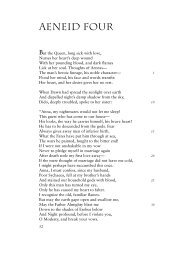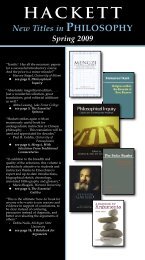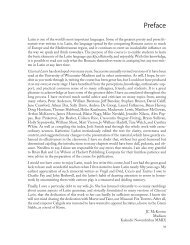Study and Discussion Questions for Early Buddhist Discourses
Study and Discussion Questions for Early Buddhist Discourses
Study and Discussion Questions for Early Buddhist Discourses
- No tags were found...
Create successful ePaper yourself
Turn your PDF publications into a flip-book with our unique Google optimized e-Paper software.
5) The tenfold <strong>for</strong>mula is supposed to explain the arising <strong>and</strong> ceasing of suffering without anymetaphysical commitments to a permanent Self—is that possible? Who is it, then, thatsuffers?6) The denial of a permanent Self is perhaps Buddhism’s most notable departure <strong>for</strong> otherreligious <strong>and</strong> philosophical traditions. Christians <strong>and</strong> Platonists believe in an immortalsoul; Hindus believe in the permanent ātman—but the <strong>Buddhist</strong> tradition denies theseviews of a permanent Self as pernicious lies. What arguments do the <strong>Buddhist</strong>s offer tosupport this position? How might a Christian or Hindu reply to the <strong>Buddhist</strong> analysis?What specific type of permanent Self do the various traditions declare(material/immaterial, limited/unlimited)?7) What depends on the view of a permanent Self or soul?8) Why would “feeling” be so closely associated with a person’s self? What are the Buddha’scounterarguments to such a view? Are his counterarguments effective?9) Why is it not proper to speculate about the existence of the Tathāgata after death? Should notthe Buddha make some commitment to the status of a Tathāgata after death? Is it not theproper function of a religious tradition to offer some answers (or even solace) on thematter of death?10) Is there any reasonable way to justify the Buddha’s claims about the “seven states ofconsciousness <strong>and</strong> the two planes” without experiencing these oneself? Must one acceptthese teachings on faith?11) Do other religious <strong>and</strong> philosophical traditions have “stages of liberation” like Buddhism?Do other traditions focus on psychological development in ways similar to the <strong>Buddhist</strong>path?12) In the early <strong>Buddhist</strong> tradition, the one who is liberated continues to dwell in this world.How is this different from the image of liberation in other religious <strong>and</strong> philosophicaltraditions? Is there any reason to think liberation can be achieved without removingoneself from this world (after all, even <strong>Buddhist</strong> see this world as a place fraught withsuffering <strong>and</strong> woe)?









